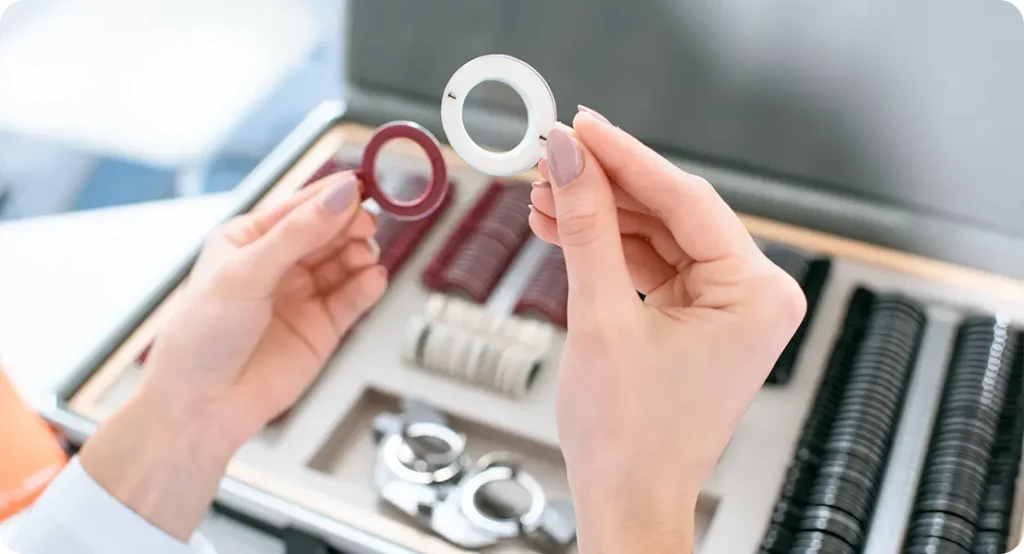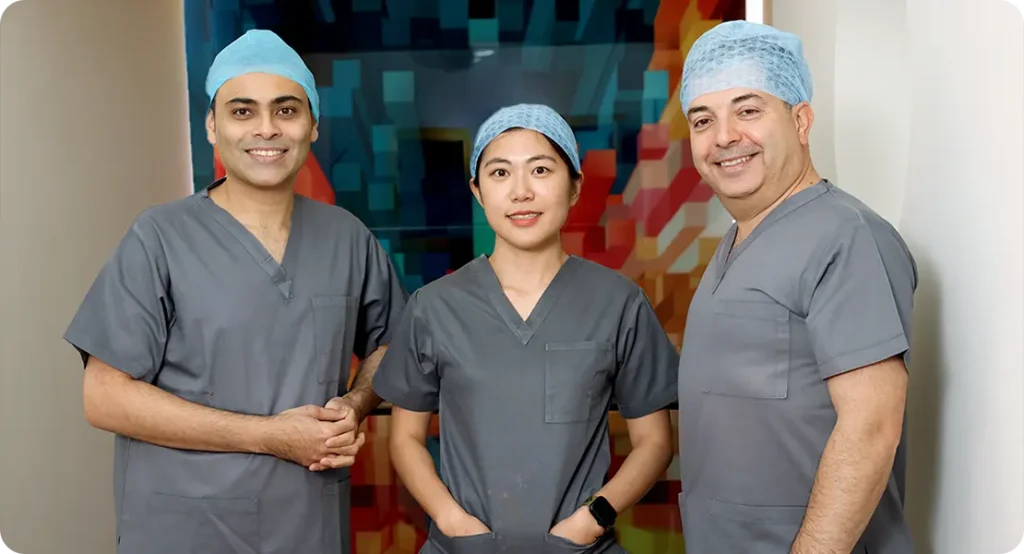If you’re considering private cataract surgery in London, choosing the right clinic is crucial for achieving the best possible outcome. With so many options available, it can be overwhelming to decide which one is right for you.
To help simplify the process, here are 13 essential tips to guide you in your search:
1. Check the Surgeon’s Credentials
A reputable clinic should have highly qualified ophthalmic surgeons who are registered with the General Medical Council (GMC) and members of professional bodies like the Royal College of Ophthalmologists. These affiliations ensure that the surgeon meets strict professional standards and undergoes continuous training to stay up to date with the latest advancements in cataract surgery.
Beyond professional registration, it’s also important to look into the surgeon’s specific experience with cataract procedures. Some surgeons specialise exclusively in cataract surgery, while others perform it alongside various other eye procedures. The more experience they have with cataract cases, particularly complex ones, the better equipped they will be to handle any potential complications.
You should also check if the surgeon has received any accolades or recognition in the field of ophthalmology. Awards, published research, and teaching positions in respected medical institutions can be strong indicators of their expertise. Many leading cataract surgeons in London have contributed to advancements in surgical techniques and may have international recognition.
Lastly, don’t hesitate to ask the clinic for a direct consultation with the surgeon before committing to treatment. This gives you an opportunity to discuss your case, ask any questions, and assess their communication skills. A skilled surgeon should not only be technically proficient but also approachable and willing to explain the procedure clearly.
2. Assess Clinic Reputation and Reviews
A clinic’s reputation is built on patient satisfaction, successful outcomes, and professional excellence. One of the best ways to gauge this is by looking at patient reviews across multiple platforms. Websites like Trustpilot, Doctify, and Google Reviews provide insights from real patients, giving you an honest perspective on the quality of care provided.

While reading reviews, pay attention to common themes. Consistently positive feedback on aspects like professionalism, cleanliness, friendliness of staff, and post-operative support indicates a well-run clinic. Conversely, if you see recurring complaints about long wait times, lack of communication, or unsatisfactory results, these could be red flags.
It’s also helpful to check if the clinic has received any industry awards or accreditations. Many top-tier private clinics in London undergo independent assessments by regulatory bodies such as the Care Quality Commission (CQC). A high rating from the CQC is a strong indication of excellent patient care and safety standards.
Additionally, consider asking for direct patient referrals from the clinic. Some clinics have past patients who are willing to share their experiences in more detail. Speaking to someone who has undergone the procedure at the clinic can provide valuable first-hand insights into what to expect.
3. Ensure the Use of Advanced Technology
The quality of technology used in cataract surgery can significantly affect the outcome. Modern techniques like femtosecond laser-assisted surgery provide greater precision, reduce complications, and enhance recovery times compared to traditional methods. A leading clinic should have the latest surgical tools and diagnostic equipment to ensure the best possible results.
One of the most important technological advancements in cataract surgery is the use of premium intraocular lenses (IOLs). Some clinics only offer standard monofocal lenses, while others provide multifocal, toric, and extended-depth-of-focus lenses. These options can improve vision at different distances and reduce dependence on glasses post-surgery.
Additionally, advanced imaging techniques such as Optical Coherence Tomography (OCT) and wavefront analysis can help surgeons customise the procedure to each patient’s unique eye structure. The availability of such diagnostic tools indicates that the clinic is committed to providing a tailored and precise approach to cataract treatment.
When choosing a clinic, ask about the equipment they use and how frequently it is updated. A well-equipped clinic will invest in the latest innovations to provide safer, more effective treatment. If the clinic relies on outdated technology, it may be worth considering alternative options.
4. Verify the Range of Lens Options Available
Cataract surgery is not just about removing the cloudy lens; it also involves replacing it with an artificial intraocular lens (IOL). The type of lens you receive can have a lasting impact on your vision. A high-quality clinic should offer a range of lens options to suit different patient needs and lifestyles.
Monofocal lenses are the most common and provide clear vision at a single distance, typically for distance vision. Patients with these lenses usually require reading glasses. Multifocal and trifocal lenses, on the other hand, allow for better vision at multiple distances, reducing the need for glasses. Toric lenses are designed for those with astigmatism, correcting both cataracts and refractive errors simultaneously.

During your consultation, the clinic should conduct a detailed assessment of your vision requirements. Factors such as your daily activities, hobbies, and work demands should be taken into account when recommending a lens type. A good clinic will explain the pros and cons of each lens type rather than pushing a specific option.
Furthermore, the clinic should use premium lens brands with proven success rates. The quality of the IOL material, design, and longevity should be discussed before making a decision. Some of the best clinics work with leading manufacturers to provide lenses that offer superior clarity and long-term durability.
5. Inquire About Consultation and Diagnostic Services
A thorough pre-operative assessment is vital for successful surgery. The clinic should conduct a comprehensive eye examination using advanced diagnostic tools to tailor treatment to your specific needs. Tests such as corneal topography, optical biometry, and contrast sensitivity assessments help determine the best approach for your cataract surgery.
A well-structured consultation should include an in-depth discussion about your medical history and any existing eye conditions. Conditions like glaucoma, macular degeneration, or diabetic retinopathy can impact the choice of intraocular lens and surgical approach. A reputable clinic will ensure that these factors are carefully considered before proceeding.
Additionally, the consultation should include a discussion about realistic expectations and potential risks. Every surgical procedure carries some level of risk, and a responsible clinic will ensure that you are well informed about any potential complications. They should also provide details about the recovery timeline and any necessary precautions post-surgery.
Finally, the diagnostic process should be thorough but not rushed. If a clinic appears to be hurrying through assessments without explaining results or options properly, it may not prioritise patient-centred care. Choosing a clinic that values detailed pre-operative planning can make a significant difference in the final outcome of your surgery.
6. Consider the Location and Accessibility
The location of the clinic plays a crucial role in ensuring a smooth experience, especially since cataract surgery requires pre-operative consultations and post-operative follow-ups. Choosing a clinic that is conveniently located within London can save you time and reduce the stress of travelling, particularly if you have mobility issues or require assistance getting to and from appointments.
Accessibility is also important. The clinic should be easily reachable by public transport, and if you plan to drive, check if they offer parking facilities nearby. Some private clinics in London are located in areas with limited parking, making it necessary to factor in alternative transport arrangements or drop-off points.

Additionally, the clinic’s interior layout should be designed with accessibility in mind. Features such as wheelchair access, lift availability, and comfortable waiting areas can make a significant difference in your overall experience, particularly if you have other health conditions affecting mobility.
Lastly, consider how well-connected the clinic is to emergency medical services. Although complications in cataract surgery are rare, it’s reassuring to know that the clinic has established links with nearby hospitals or specialists should additional care be required.
7. Look Into the Waiting Times
One of the main reasons people opt for private cataract surgery is to avoid long NHS waiting lists. However, waiting times can still vary significantly between private clinics. A reputable clinic should be able to schedule consultations and surgery dates promptly, ensuring you receive timely treatment.
Ask the clinic for an estimate of how soon you can have your initial consultation and surgery. Some clinics offer same-week appointments, while others may have a waiting period of a few weeks due to high demand. If speed is a priority for you, this can be an essential deciding factor.
Beyond surgery scheduling, also consider the waiting times for follow-up appointments. Good clinics prioritise post-operative care and ensure that patients can easily book reviews and check-ups without unnecessary delays.
It’s also worth checking if the clinic offers fast-track options or emergency slots for patients experiencing worsening symptoms. A flexible scheduling system demonstrates a clinic’s commitment to patient care and convenience.
8. Ask About the Cost and Financing Options
Private cataract surgery can be a significant financial investment, so it’s essential to understand the full cost before making a decision. Reputable clinics should provide a clear and itemised pricing structure, covering consultation fees, surgery costs, intraocular lenses, and any additional expenses such as follow-up visits or medication.
Be wary of clinics that advertise low starting prices but have hidden fees. Some may charge extra for premium lens options, advanced laser-assisted techniques, or post-operative care. Always ask for a comprehensive breakdown of costs so you can budget accordingly.

If the upfront cost is a concern, check if the clinic offers financing plans. Many private clinics provide flexible payment options, including interest-free instalments or medical financing services. This can help spread the cost and make the procedure more accessible.
Additionally, if you have private health insurance, verify whether cataract surgery is covered under your policy. Some insurers cover part or all of the cost, depending on the provider and your specific policy details.
9. Check for Personalised Treatment Plans
No two patients have the exact same visual needs, and a good clinic should take a personalised approach to treatment. The best clinics conduct in-depth assessments and tailor the surgical procedure, lens choice, and aftercare plan to suit each individual’s lifestyle and vision goals.
During your consultation, observe whether the surgeon takes time to discuss your personal needs. They should ask about your work environment, hobbies, and expectations for post-surgery vision. For example, someone who enjoys reading and close-up work may have different lens needs compared to someone who prioritises driving or outdoor activities.
Personalised treatment also extends to post-operative care. A high-quality clinic will monitor your progress and make adjustments where necessary, ensuring that you achieve the best possible outcome.
A patient-centred approach indicates a clinic’s commitment to quality care. If a clinic follows a rigid, one-size-fits-all model without considering your unique vision requirements, you may want to look elsewhere.
10. Evaluate the Quality of Aftercare Services
Aftercare is a crucial aspect of cataract surgery, as a well-managed recovery process leads to better outcomes. A reputable clinic should provide structured follow-up care, ensuring your healing progresses as expected and addressing any concerns you may have.
Ask about the number of follow-up appointments included in the treatment package. Some clinics offer standard post-op check-ups within 24 hours, one week, and one month after surgery, while others may provide extended care for up to six months.

It’s also essential to check how easily you can reach the clinic in case of post-operative issues. Some clinics have dedicated helplines, while others offer virtual consultations for added convenience. Knowing you have reliable access to expert advice can provide peace of mind during recovery.
Furthermore, the clinic should provide clear post-surgery care instructions, including guidance on medication, eye protection, and activity restrictions. A well-organised aftercare system reflects a clinic’s dedication to long-term patient satisfaction.
11. Find Out About Success Rates and Complication Management
A good private clinic should have a strong track record of successful cataract surgeries. Don’t hesitate to ask about their success rates, particularly for patients with similar vision conditions to yours. Clinics should be transparent with their data and provide reassurance based on their past results.
Additionally, ask how they handle complications. While cataract surgery is generally safe, no medical procedure is entirely risk-free. A trustworthy clinic will have clear protocols for managing issues such as infections, lens misalignment, or residual refractive errors.
It’s also helpful to know if the clinic offers corrective procedures in case the initial outcome does not fully meet your expectations. Some clinics provide enhancements or adjustments at no additional cost within a specified period.
Reassurance about complication management indicates that a clinic is prepared for all scenarios and prioritises patient safety over simply performing a high volume of procedures.
12. Look for Clinics Offering a Second Opinion
If you have any doubts about your diagnosis or the recommended treatment plan, seeking a second opinion can be invaluable. A reputable clinic should welcome the opportunity to review your case and provide an independent assessment without pressuring you into immediate treatment.
Many private clinics offer second-opinion consultations where another experienced ophthalmologist evaluates your test results and discusses alternative treatment options. This can be particularly useful if you’ve received conflicting advice or if you’re unsure about the lens choice.
A second opinion also allows you to compare different clinics’ approaches and see if another provider offers a more tailored solution to your needs. Clinics that encourage second opinions demonstrate confidence in their expertise and a genuine commitment to patient care.
If a clinic discourages second opinions or tries to rush you into surgery, this could be a red flag indicating a profit-driven approach rather than patient-centred care.
13. Assess the Overall Patient Experience
From the initial inquiry to post-surgery follow-ups, the overall patient experience should be seamless, professional, and reassuring. A well-run clinic should have friendly and knowledgeable staff, a comfortable environment, and clear communication at every stage.
Observe how the clinic handles patient inquiries. Do they respond promptly to phone calls and emails? Are they willing to answer questions in detail, or do they seem rushed? Excellent customer service is a strong indicator of a clinic that values patient satisfaction.

The consultation process should be thorough, with no pressure to make quick decisions. A good clinic will provide you with all the necessary information, including written materials and time to consider your options.
Finally, take note of the overall atmosphere. A welcoming and well-organised clinic reflects a team that takes pride in their work and is dedicated to providing the best possible care to their patients.
14. Final Thoughts
Choosing the right private cataract surgery clinic in London requires careful research and consideration. By evaluating key factors such as surgeon credentials, clinic reputation, technology used, and personalised treatment plans, you can ensure that you receive the highest quality care for your vision.
It’s important to take your time when making a decision and not feel pressured into choosing the first clinic you come across. Comparing options, reading patient reviews, and seeking second opinions can help you make an informed choice that aligns with your specific needs and expectations.
If you’re searching for a reputable cataract surgery clinic in London, London Cataract Surgery is available to discuss your needs. Our team of experienced specialists provides comprehensive consultations, state-of-the-art technology, and tailored treatment plans to ensure the best possible results.

